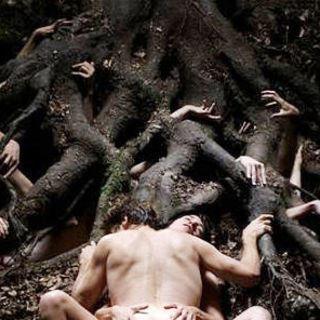
(In the genuinely anti-American Dogville, he's called Tom Edison.) The husband is a smug, sententious fool, a type that appears in many von Trier movies. The story was inspired in part by von Trier's own severe depression, and She is clearly closer to the writer-director than He. Yet Antichrist can't be dismissed simply as anti-American or misogynist. (He doesn't fly.) They also tend to focus on women, who are generally abused and debased. Since von Trier began making English-language films with 1996's Breaking the Waves, most of his features have been set in the United States, a country he's never visited. But they're no less enigmatic than what came before. The movie's final moments, which introduce a group of spectral extras, are more dream than nightmare. Then the frenzy abates, and the Handel and the black-and-white return. She attacks him savagely, then mutilates herself because the couple's antagonism is entangled with desire, much of the violence is directed toward various genitalia.

She has been writing a thesis on "gynocide," and He becomes the personification of all men who have ever brutalized women. In the woods, nature is embodied by malevolent trees and dead and dying animals - including a wounded fox that delivers a warning in a demonic growl that's right out of a '70s horror flick, a noise more goofy than ominous.Īs He puts She through "exercises" meant to banish her sorrow, the woman's resentment grows. When her husband takes her to their gloomy forest retreat for treatment, Gainsbourg's character begins to see him as the enemy - and takes brutal action.Ĭhristian Geisnaes/Zentropa Entertainments Freud couldn't have envisioned a tidier sex-and-death scenario. Then the couple's toddler son climbs from his crib, sees his parents in rut and tumbles out the window to a snowy death. (The actors were doubled by porn veterans at such moments.) This might be an upscale perfume ad, except for one X-rated shot. In the opening sequence, He and She (Willem Dafoe and Charlotte Gainsbourg) make slo-mo love in the shower, their bodies filmed in black and white while a Handel aria plays and snow falls outside an open window.

Von Trier has cited the influence of dour Swedish playwright August Strindberg, but another dramatist comes to mind: Bertolt Brecht, whose self-conscious anti-naturalistic style underlies all of von Trier's work.Īntichrist doesn't delay its first onslaught. It's beautiful yet assaultive, sometimes smart but often silly, both insightful and glib about the mysteries of desire, grief and fear.

Not in Antichrist, which just keeps pressing deeper into a conceptual thicket.īoth hailed and reviled at the Cannes Film Festival, this two-person drama actually seems designed to draw an ambivalent response. Danish cinematic insurgent Lars von Trier always goes too far, yet sometimes he circles back to lucidity.


 0 kommentar(er)
0 kommentar(er)
